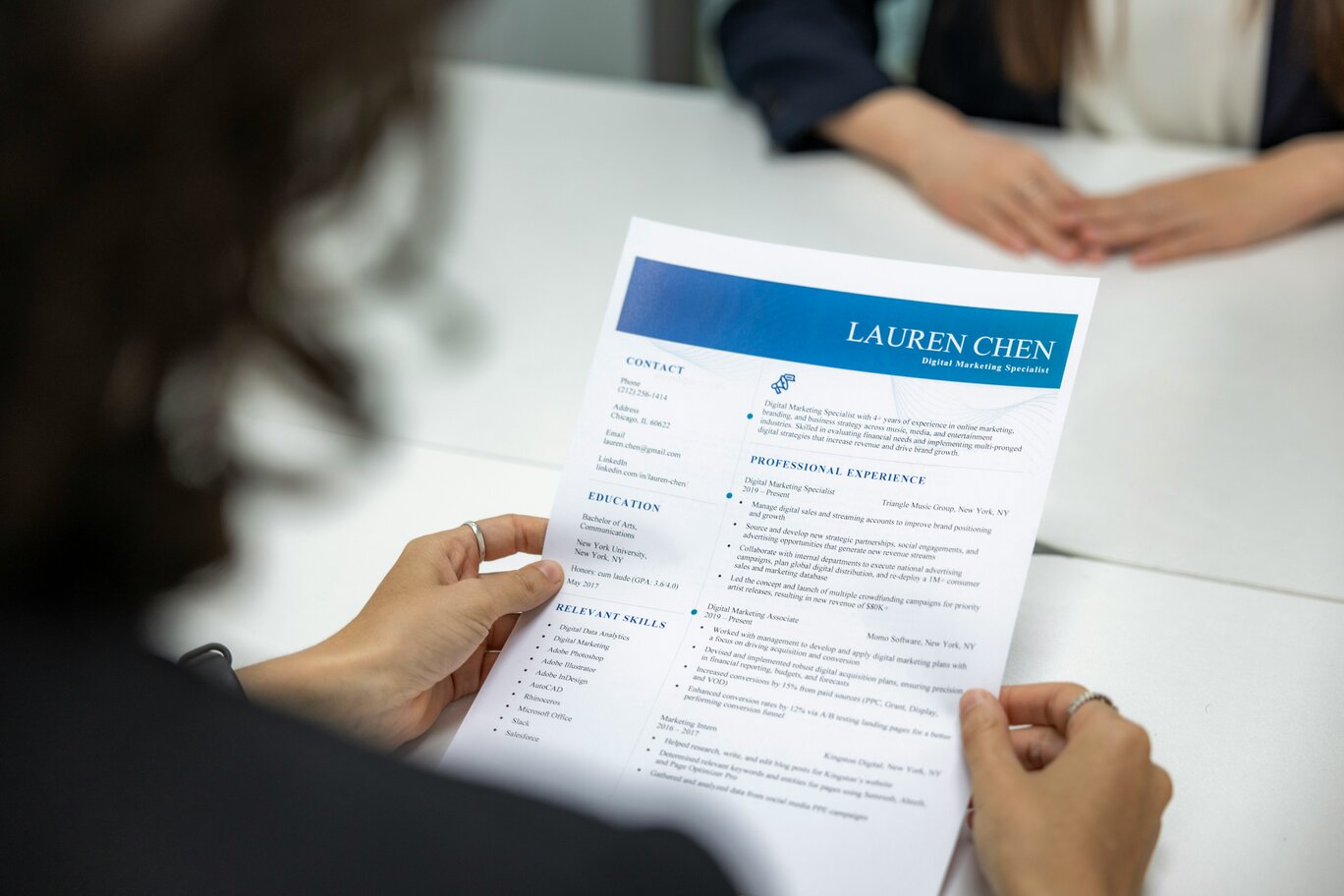
Create the Best CV
How people view a CV can be likened to asking someone who is a better footballer… Pele or Maradona? Ronaldo or Messi? It’s all about opinions. (it’s Maradona and Messi by the way!) Can anyone be right or wrong about what a good CV looks like? What might be great to one hiring manager, could be totally different from another and, whilst it’s unlikely to be something you debate over a few beers with your mate in the pub, having a great CV is very important.
At 365Jobs, we have an extensive background in Recruitment, and we wanted to offer some tips on how you can Create the Best CV… in our opinion anyway! Our summary below provides some rationale as to why we believe that our suggestions will improve your chances of securing an interview for your dream job!
Overriding CV principle
Always remember that “a CV is to get you the interview, not get you the job”, therefore make sure you only include information that NEEDS to be there to support this objective. Anything irrelevant you include takes up valuable space, and valuable seconds of the reader’s time that could be spent reading something that is relevant.
Perhaps you think that sounds a bit pointless, but if the hiring manager is reading about your marital status, how many children you have, their ages and names – that could be 2 or 3 seconds (not including the extra seconds they spend wondering why you put it on there in the first place!) out of the 30-60 seconds they are able to spend on your CV because they have so many to go through!
The perfect CV Length
In my opinion, a CV should be a maximum of 2 pages long. A 1 page CV could be ideal for a first CV when you haven’t got too much to say or if you’re applying for a Creative role, but if you’re an experienced candidate, I would recommend 2 pages. Hiring managers will always turn the CV over expecting to see more information on the back page, so if you have 1 page of information instead of 2 you have probably excluded some potentially important information.
- Personal Details
You make think that this is a given but, it’s not! Think of what a hiring manager is interested in… whereabouts you are based, your name and how they can get hold of you. The rest of the personal information you want to share can be done during the interview.
- You don’t need to put your full address, just the town
- Just your e-mail address and mobile number is fine, and they will never fax you!
- A LinkedIn link is worthwhile including, particularly if you have some recommendations on there
- Personal Statement
This first paragraph should be a summary of you (the candidate), your relevant background and why you are particularly suitable for the role which you are submitting the CV for. Make it specific to the role you are applying for, so include any relevant qualifications in here and any methodologies specific to the industry. Being the first thing on the CV, this is an important paragraph so include anything you think will make it memorable (for the right reasons!) to the reader.
- You don’t need to head it up as ‘Personal Statement’ – the reader will know what it is and it saves space
- For a generic CV that you are sending out, include what sort of opportunity you are seeking, what type of employer you want to work for and what they provide e.g. study support.
- It should only be the 1 paragraph long, between 7-9 lines otherwise it will become too long
- Business Skills/Key Achievements
Hiring Manager’s want to see where you can add value to their team. What better way to sell yourself that to advertise the brilliant things you’ve achieved in your previous roles. It also gives you the opportunity to pull out anything really relevant from your entire work history (not matter how old) and get it front and centre near the top of page 1 for the Hiring Manager to see.
- The length of this section should be 4 or 5 bullet points for key achievements (as they are generally going to be longer than 1 line) and 5-7 for Business Skills (as these are generally 1 line – per the model CV).
- Highlight something here that you are proud of. It could come from your working experience, as part of your education or something in your personal life that tells something additional about you.
- Structure a professional key achievement: In this role I identified a problem, I researched a solution, recommended a fix to the appropriate people for approval and implemented the solution which saw £X benefit/savings.
- Professional Experience (Your last 3-5 jobs in detail)
Your professional experience is a brief summary of your current role, along with the previous positions you’ve held. Key pieces of information are the job title, the company name, the location, and the dates (from-to) that you worked at the company.
- Keep the description of the role to an initial sentence or two, along with 3-4 bullet points containing a combination of your key achievements, relevant tasks, applications worked with etc that best relate to the job you’re applying for.
- Identify probably a maximum of 7 years worth of roles in detail and summarise any older roles at a job title, employer and dates level.
- If you have moved internally within a company, be creative with how you capture that information on your CV to try and minimise the space it takes up.
- If you have any gaps in your CV, I would suggest noting them and putting an explanation in – even if that was ‘career break following redundancy’ or something like that. The model CV contains a 2 month break but that was 5 years ago so I haven’t explained that.
- Professional Experience (Summarise your job history)
Keeping in mind the principle of including as much relevant information as possible, summarise your job history beyond a maximum of 7 years from now. Think about when you’re applying for a loan or a mortgage, the lender is only interested in your last 3-5 years of financial information and it’s the same principle for job history. Industries have moved on, times have changed and there have been developments & changes in processes and practices since the last time you worked in that role/industry.
- Identify probably a maximum of 7 years worth of roles in detail and summarise any older roles at a job title, employer and dates level.
- If you have some experience relevant to the role you’re applying from more than 7 years ago, try to highlight it in your key achievements section, or your personal statement where it is likely to peak the readers interest.
- If you worked in Burger King, Top Man or Andy’s Records whilst you were at college and that was long enough ago to have worked at Andy’s Records, then it’s probably not relevant to your application and therefore there’s no need to even mention it on your CV.
- Qualifications
Depending on what qualifications you’ve got, how good they are and most importantly, how relevant they are to your application, you can make this section as big or small as you want. If you’re in your mid 40’s then your GCSE’s are probably not very relevant… and if you’ve got O’levels then I would recommend not taking up any precious space on your CV for those.
- If you are struggling for space, then make sure you only include the most relevant qualifications. That cocktail mixing class you did might mean you can make a mean daquiri, but that’s not necessarily something the hiring manager is going to be too interested in.
- If you are recently out of university, or your qualifications are actually the stand out factor of your CV, then move them higher up. The key is to make sure you ‘top load’ the CV so the most relevant information is the first thing the hiring manager reads.
- Recommendations (instead of references)
The idea of a CV is to sell yourself to a hiring manager but, how much better if you can get other people to sell you?! Any hiring manager already knows that, if you are successful with your application, they can ask you to provide some references; so putting ‘references available on request’ at the end of your CV is almost pointless! Instead, why not include some comments or recommendations where someone else is letting the reader know that you are worth speaking with.
- Ask some ex-colleagues, manager’s or stakeholders to provide a couple of sentences of feedback for you which you can lift some key quotes from.
- If you don’t have a great deal of work experience, or you are studying, then ask teachers or lecturers to provide you with a recommendation instead – they are respected professionals after all.
- I would suggest including 2-3 quotes or recommendations at the bottom of the CV, or whatever the space allows for. If you don’t have enough space, assess whether the feedback is more relevant that some of the other things you’ve included – and if it is, then make some changes to squeeze it in!
Don’t fall into these CV traps
Avoid sharing unnecessary information with the reader. They are probably not interested in your hobbies at this stage even if you are a mean cook that will wow them at the annual office bake off competition. At the stage, even though you love your family, how many children you have or your marital status is not something a hiring manager is going to need to know. The interview is where they will get to know you better, and hopefully the job itself!
If you would live an electronic copy of a CV template containing all these great tips, for you to just add your personal career information on it, please e-mail us on hello@365Jobs.co.uk



